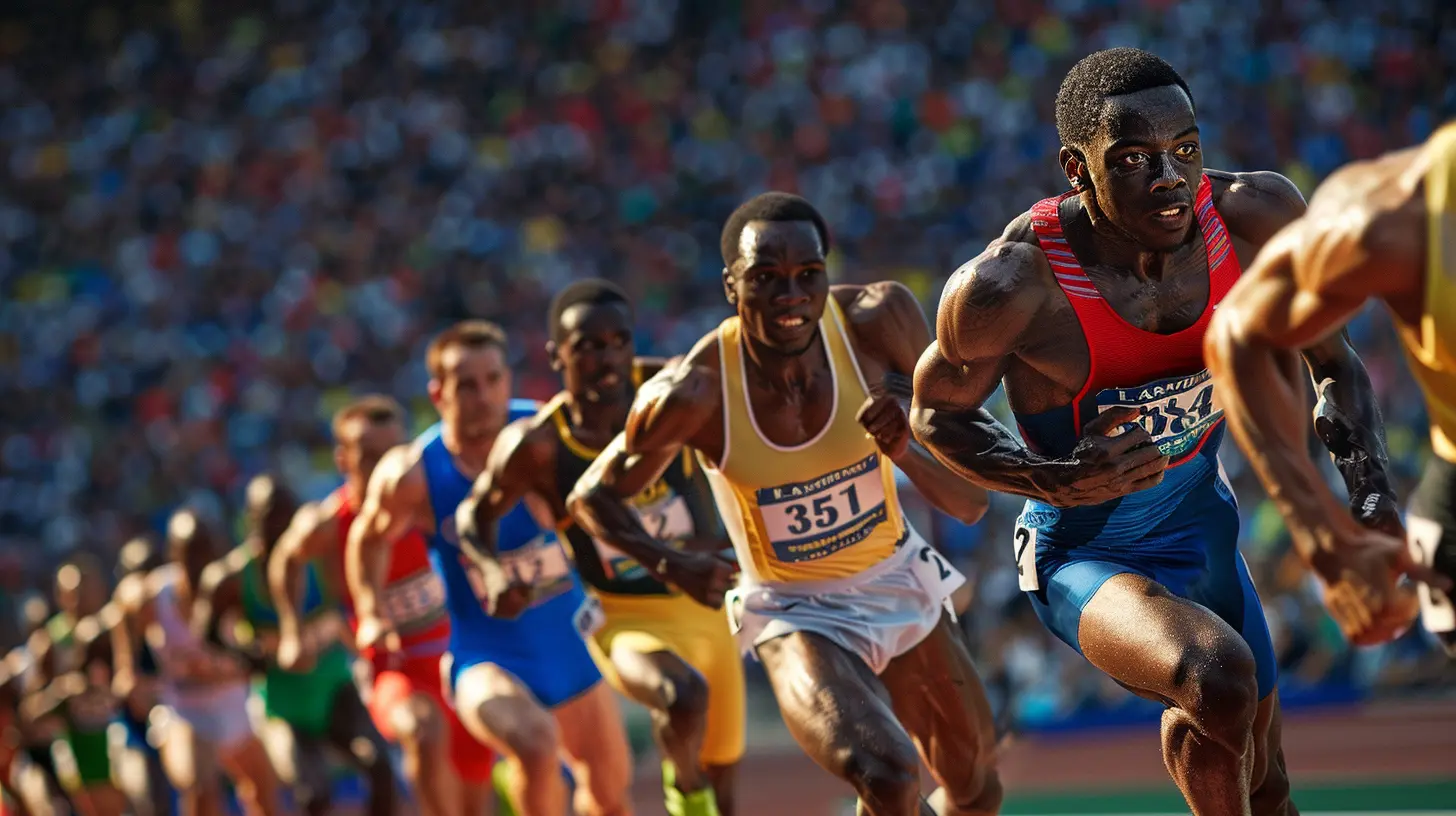Analyzing Your Performance: How to Learn from Every Race
22 December 2024
Whether you're a seasoned athlete or a weekend warrior, every race you run offers valuable lessons. But here's the thing: It's not just about crossing the finish line; it's about understanding what worked, what didn’t, and how you can improve for the next race. That’s what separates good athletes from great ones. The ability to analyze your performance is crucial, and with the right mindset, every race becomes a stepping stone toward becoming a better, faster, and smarter runner.
In this article, we’re going to break down how you can analyze your performance after each race so you can continue improving and, ultimately, achieve your goals. Buckle up because we’re about to dive deep into the nitty-gritty of race analysis!

Why Analyzing Your Race Performance Matters
You know that feeling after a race—sometimes it’s exhilaration, sometimes it’s frustration. But no matter how you feel, reflecting on your performance is key to long-term success. The race is over, but the real work begins in the post-race analysis.Why does it matter? Well, think about it like this: If you don’t take time to figure out what went wrong or right, you’re likely to repeat the same mistakes, or worse, miss out on opportunities for improvement. It’s like driving with your eyes closed—you’re going somewhere, but you have no idea where or how you got there.
By analyzing your performance, you’ll not only gain insights into your physical condition but also your mental approach, race strategy, and even external factors like weather or terrain. This comprehensive review will help you tweak your training, adjust your mindset, and ultimately, fine-tune your race-day game plan.

Step 1: Reflect on Your Race Goals
Before you dive into the nitty-gritty of splits and pacing, take a step back and ask yourself, "What were my goals for this race?" Did you aim for a personal best? Were you trying to finish without walking? Or maybe you were just getting back into the sport after a break.Whatever your goals, reflect on them and see how they align with your actual performance. Sometimes, we get so caught up in the numbers that we forget about the bigger picture. If your goal was to enjoy the race and you did that, then in many ways, you were successful.
Questions to Ask Yourself:
- Did I meet my race goals?- If not, what held me back?
- If I exceeded them, what contributed to my success?

Step 2: Analyze Your Pacing Strategy
Pacing is everything when it comes to races. Whether you're running a 5K or a marathon, your pacing can make or break your performance. After the race, take a look at your splits. Were you consistent throughout the race, or did you start too fast and fade toward the end?Many runners fall into the trap of starting too fast because of the adrenaline rush at the starting line. But remember, a race is a marathon, not a sprint (even if you’re literally sprinting in a short-distance race). Consistent pacing is key to conserving energy and finishing strong.
Key Metrics to Review:
- Negative Splits: Did you run the second half of the race faster than the first? This is often a sign of good pacing.- Positive Splits: Did you start strong but slow down significantly in the second half? If so, you might need to work on your pacing strategy.
- Even Splits: Did you maintain a consistent pace throughout the race? This is usually ideal for longer races.

Step 3: Evaluate Your Nutrition and Hydration
You wouldn’t expect your car to run well without gas, right? The same goes for your body. How you fuel and hydrate during a race can have a massive impact on your performance.Think back to what you ate the night before the race, your breakfast on race day, and how you fueled during the event. Did you feel sluggish? Did you cramp up? Or did you feel energized and focused? These are your body’s signals telling you what worked and what didn’t.
Things to Consider:
- Pre-Race Meal: Did you eat something that sat well in your stomach and gave you the energy you needed?- During the Race: Did you hydrate enough? Did you take in carbs, electrolytes, or gels at the right intervals?
- Post-Race Recovery: How did you feel after the race? Were you completely depleted, or did you recover quickly?
Step 4: Assess Your Mental Game
Running isn’t just a physical challenge—it’s a mental one, too. How did you handle the mental aspects of the race? Did you stay focused, or did negative thoughts creep in? Did you push through the tough parts, or did you let fatigue get the better of you? Your mindset can be the difference between a strong finish and a disappointing one.Questions to Reflect On:
- Did I stay mentally focused throughout the race?- What strategies did I use to push through tough spots?
- Did I let external factors (weather, other runners, etc.) affect my mental state?
Step 5: Review Your Race Day Conditions
Sometimes, it’s not you; it’s the conditions. Weather, terrain, and even competition can play a huge role in how you perform. Reflect on the conditions you faced during the race. Was it hotter than expected? Did the course have more hills than you anticipated? These factors can significantly affect your performance, so don’t be too hard on yourself if things didn’t go as planned.Key Factors to Analyze:
- Weather: Was it too hot, cold, windy, or humid? How did it affect your performance?- Terrain: Was the course hilly, or was it mostly flat? Did you prepare adequately for the course?
- Crowd Support: Did the energy from the spectators help motivate you, or did the chaos at the start line throw you off?
Step 6: Look at Your Training Leading Up to the Race
Your race performance is a reflection of all the work you’ve put in during training. Take a long, hard look at your training regimen leading up to the race. Did you hit all your key workouts? Did you taper properly? Or did you overtrain and feel fatigued on race day? Your training plan should be tailored to the specific demands of the race, so any missteps here will likely show up in your performance.Things to Reflect On:
- Consistency: Did you stick to your training plan, or were there gaps?- Intensity: Was your training too hard or too easy?
- Tapering: Did you allow enough time to rest and recover before the race?
Step 7: Identify Areas for Improvement
By now, you’ve gathered tons of valuable information about your race. The next step is to use this information to identify areas for improvement. Whether it’s pacing, nutrition, mental toughness, or training consistency, there’s always something you can work on to get better.But don’t just stop at identifying these areas—take action! Create a plan to address your weaknesses in your next training cycle.
Action Steps:
- If your pacing was off, consider incorporating more tempo runs into your training.- If your nutrition was lacking, experiment with different pre-race meals and fueling strategies.
- If your mental game needs work, practice mindfulness or visualization techniques during your runs.
Step 8: Celebrate Your Successes
Last but not least, don’t forget to celebrate your successes! Even if the race didn’t go exactly as planned, there’s always something to be proud of. Maybe you finished stronger than you expected, or perhaps you learned a valuable lesson that will help you in the future. Whatever it is, take a moment to appreciate how far you’ve come.Racing isn’t just about the finish line; it’s about the journey. So even if you didn’t hit your target time or placement, remember that every race is progress toward becoming a better athlete.
Conclusion
Analyzing your performance after every race is essential if you want to improve as an athlete. By reflecting on your goals, pacing, nutrition, mental game, and race-day conditions, you’ll gain valuable insights into what worked and what didn’t. More importantly, you’ll be able to use this information to fine-tune your training, tweak your race strategy, and ultimately, perform better in your next race.So, the next time you cross the finish line, don’t just grab your medal and go home. Take some time to reflect, analyze, and learn. Every race is a lesson, and with each lesson, you’re one step closer to becoming the best version of yourself.
all images in this post were generated using AI tools
Category:
AthleticsAuthor:

Uziel Franco
Discussion
rate this article
17 comments
Liv McCabe
Great insights! Remember, every race is a chance to grow, not just compete. Embrace the lessons, celebrate the small victories, and keep that positive spirit alive. Each step forward, whether fast or slow, is a step toward becoming your best self. Keep running and smiling! 🏃♀️😊
March 23, 2025 at 9:21 PM

Uziel Franco
Thank you! I completely agree—each race is a valuable learning opportunity, and celebrating every step is essential for growth. Let's keep that positive mindset! 🏃♀️😊
Georgina Warner
In every stride, both triumph and fall, Lessons whispered through the finish line's call, Embrace the journey, rise above all.
February 5, 2025 at 4:19 AM

Uziel Franco
Thank you for your insightful comment! Embracing both triumphs and setbacks is essential for growth in racing and beyond.
Meredith McGee
Oh sure, because nothing screams "expert analysis" quite like dissecting every little mistake I made while tripping over my shoelaces and wondering why I thought running a marathon was a good idea in the first place!
January 31, 2025 at 12:49 PM

Uziel Franco
I appreciate your perspective—every misstep can provide valuable lessons for growth!
Celeste McGrath
Every race is a journey filled with lessons. Embrace the highs and lows; they shape your growth and resilience. Remember, it's not just about the finish line, but the progress you make along the way.
January 26, 2025 at 5:05 AM

Uziel Franco
Thank you for your insightful comment! Embracing both the highs and lows truly enhances our growth and understanding of our racing journeys.
Siena McWhorter
“Great insights, thank you!”
January 18, 2025 at 8:38 PM

Uziel Franco
Thank you for your kind words! I'm glad you found the insights valuable.
Russell Chapman
Great read! I love the idea of turning every race into a learning experience. It's all about growth, right? Plus, reflecting on our performances helps us set better goals for the next one. Can't wait to implement these tips!
January 14, 2025 at 11:55 AM

Uziel Franco
Thank you! I'm glad you found it helpful. Embracing each race as a learning opportunity is key to growth. Best of luck with your next race!
Naomi McAdoo
Great insights! Embrace each race as a learning opportunity—every finish line brings growth and improvement. Keep pushing forward and believe in yourself!
January 11, 2025 at 5:24 AM

Uziel Franco
Thank you! I completely agree—each race offers valuable lessons that fuel our growth. Let’s keep learning and striving for improvement!
Elwynn McCray
Every race is a teacher; the real victory lies in embracing lessons learned, not just the finish line.
December 29, 2024 at 1:00 PM

Uziel Franco
Absolutely! Embracing the journey and lessons from each race is essential for growth, far beyond just crossing the finish line.
Vienna Lawson
Great insights! Embracing every race as a learning opportunity truly strengthens our skills and boosts our confidence. Keep inspiring!
December 27, 2024 at 4:56 AM

Uziel Franco
Thank you! I appreciate your supportive words and couldn't agree more—every race is indeed a valuable learning experience!
Francesca Banks
This article offers valuable insights into performance analysis after races. By emphasizing reflection and data-driven evaluation, it encourages athletes to identify strengths and weaknesses, ultimately fostering continuous improvement. A must-read for serious competitors!
December 26, 2024 at 4:41 AM

Uziel Franco
Thank you for your thoughtful comment! I'm glad you found the insights valuable for fostering improvement in performance analysis. Happy racing!
Lena McLemore
Great insights on performance analysis! Understanding strengths and weaknesses after each race is crucial for improvement. Your tips on reflection and goal-setting will definitely help athletes elevate their game. Keep it up!
December 25, 2024 at 11:30 AM

Uziel Franco
Thank you! I'm glad you found the insights helpful. Reflection and goal-setting are key to continuous improvement. Happy racing!
Carson Henderson
Embrace each race as a chance to grow.
December 24, 2024 at 5:29 AM

Uziel Franco
Absolutely! Each race offers valuable insights that can enhance our skills and resilience. Embracing these experiences fosters growth and improvement.
Myles Bryant
Great insights! Remember, every race teaches us something valuable. Keep pushing forward!
December 23, 2024 at 12:24 PM

Uziel Franco
Thank you! I completely agree—each race is an opportunity for growth and learning. Let’s keep striving for improvement!
Elwynn Turner
Great insights for improvement!
December 23, 2024 at 4:56 AM

Uziel Franco
Thank you! I'm glad you found the insights helpful.
Francesca Patterson
Great insights! Valuable tips for improvement.
December 22, 2024 at 9:11 PM

Uziel Franco
Thank you! I'm glad you found the tips helpful for your performance improvement.
Kian McGillivray
This article offers valuable insights on performance analysis, emphasizing the importance of learning from each race. By reflecting on strategies, strengths, and areas for improvement, athletes can enhance their training and achieve personal bests. A must-read for anyone looking to grow in their sport!
December 22, 2024 at 1:39 PM

Uziel Franco
Thank you for your feedback! I'm glad you found the insights valuable for performance analysis and personal growth in sports.
Norah McIntosh
Great insights! Learning from each race is essential for growth.
December 22, 2024 at 5:26 AM

Uziel Franco
Thank you! I'm glad you found it valuable. Continuous learning is key to improvement.
MORE POSTS

Sports and Social Skills: How Team Sports Build Better Communicators

Rugby Injuries: Prevention and Recovery for a Long Career

The Hall of Fame: A Testament to Perseverance and Skill

The Ultimate All-Star Game Playlist: Music That Sets the Mood

The Best Dunk Contests in All-Star History: A Look Back

Building Speed: Sprint Triathlon Training Tips for Faster Finishes

The Power of Visualization in Marathon Running

How to Conquer the Bike Leg of a Triathlon

Top Gym Bags to Carry All Your Essential Training Gear

How to Build Stronger Parent-Coach Relationships in Youth Sports

Running Off the Bike: Mastering the Triathlon Brick Workout